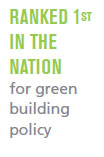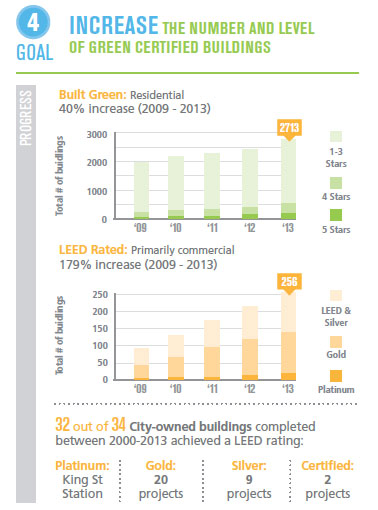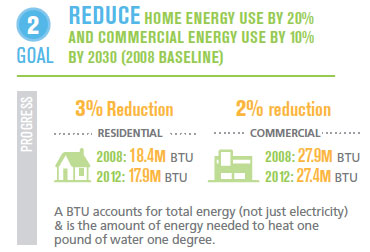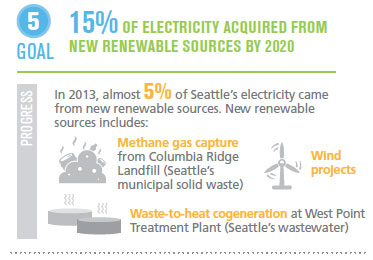Related Articles
Today is Earth Day and Crosscut has our piece highlighting the free-market approach to environmental policy. You can also hear my short interview on KUOW about the conservative approach to environmental policy.
 The City of Seattle, on the other hand, released its "Environmental Progress Report, which it admits is "not a sustainability report." What is notable is that the City and Mayor Murray highlight political successes, not actual environmental results.
The City of Seattle, on the other hand, released its "Environmental Progress Report, which it admits is "not a sustainability report." What is notable is that the City and Mayor Murray highlight political successes, not actual environmental results.
Here are four examples of how the report put politics before environmental results.
First, the City brags it "Ranks #1 in Green Building Policy." What does this mean? Nothing, really. It isn't a measure of environmental effectiveness. All it says it that someone likes city policies. The real question is whether those policies are actually reducing environmental impact. This says nothing about that.
Second. the City of Seattle claims it increased the number and level of "Green Certified Buildings" in Seattle. Many of the projects are certified LEED Gold, the second highest level.
 One again, this doesn't measure actual environmental effectiveness. Seattle City Hall is a Gold certified building and despite predictions that it would use less energy than the previous larger and older city hall, it actually uses more. Gold certification does not equate to energy efficiency.
One again, this doesn't measure actual environmental effectiveness. Seattle City Hall is a Gold certified building and despite predictions that it would use less energy than the previous larger and older city hall, it actually uses more. Gold certification does not equate to energy efficiency.
Additionally, these buildings, especially Gold certified buildings, cost much more than buildings that do not receive certification. Even if these buildings save some energy, how much are we spending to achieve tiny environmental benefits? If the City is spending thousands of dollars for every ton of CO2 it reduces, it is spending many times what California and other communities spend to achieve similar levels of environmental benefit. Put simply, Seattle may be paying a dollar to receive a dime's worth of environmental benefit.
In reality, the energy savings may yield zero environmental benefit since Seattle's energy is primarily carbon-free hydro, nuclear and some wind.
Ultimately, the City and Mayor are measuring success based on meeting a political standard, not an environmental one.
 Third, the City says it is looking to reduce residential and commercial energy use by 20% and 10% respectively by 2030. What is key here is the baseline year they chose: 2008. That was the peak energy year prior to the recession. Two years later, according to the Energy Information Administration, Washington state's electricity use fell by about four percent and natural gas demand fell by nearly 11 percent.
Third, the City says it is looking to reduce residential and commercial energy use by 20% and 10% respectively by 2030. What is key here is the baseline year they chose: 2008. That was the peak energy year prior to the recession. Two years later, according to the Energy Information Administration, Washington state's electricity use fell by about four percent and natural gas demand fell by nearly 11 percent.
The reduction Seattle highlights in its graphic is an artifact of the Great Recession. Any energy reductions are a combination of the hangover from the recession and the general trend of businesses to become more efficient, not city policies.
 Finally, the City promises to increase the percentage of "renewable" energy it uses to 15% by 2020. The irony is that Seattle has no choice about that goal -- it is the law. Initiative 937 actually requires the City to meet that goal. Failing to do so would subject the City to penalties.
Finally, the City promises to increase the percentage of "renewable" energy it uses to 15% by 2020. The irony is that Seattle has no choice about that goal -- it is the law. Initiative 937 actually requires the City to meet that goal. Failing to do so would subject the City to penalties.
What's more, as we noted, the City's electricity is already carbon-neutral. So, the City is not promising to reduce its carbon emissions. It is promising to swap inexpensive, carbon-free hydro power for expensive, carbon-free wind energy. The environment doesn't benefit. City ratepayers just pay more.
Welcome to Earth Day in Seattle. Rather than touting building efficiency, they point to political labels. Instead of pointing to city policies that improved efficiency, the City plays statistical games to take credit for reductions caused by the recession. And the City brags that it will follow the law on renewable energy, even if meeting the law does nothing for the environment.
Families and businesses don't have the luxury of confusing image with effectiveness. Families who don't reduce their energy use, pay the price. Sadly, politicians who don't reduce energy use or waste money on ineffective policies can still benefit from a green image.


